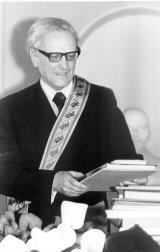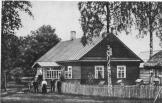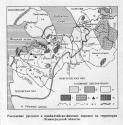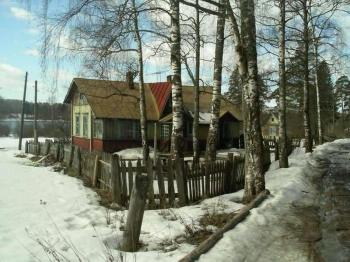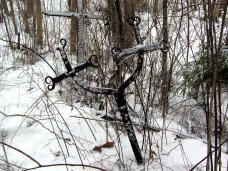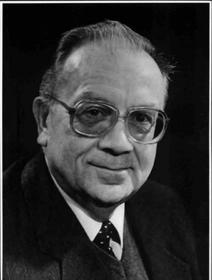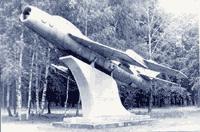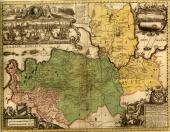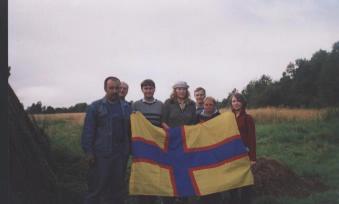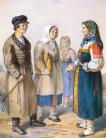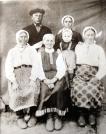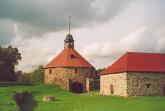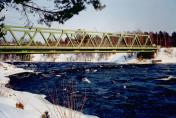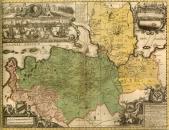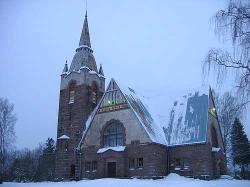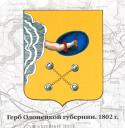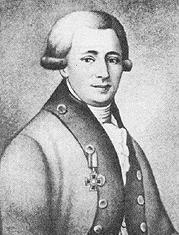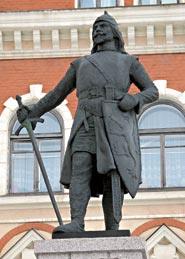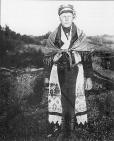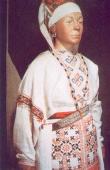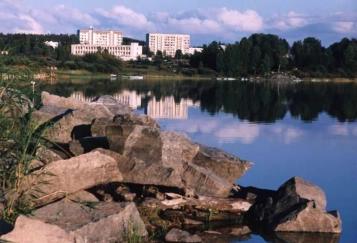|
hidden
|
Ariste, Paul, (1905-1990), a scholar
Paul Ariste (1905-1990) was a linguist, ethnographer, Doctor of Philology (1939), academician of the Academy of Science of Estonian SSR (1954). In 1927 he changed his surname Berg for Estonian one - Ariste (by the name of the village and gulf of... more
|
|
|
|
hidden
|
Eparhy of Olonets and Kargopol
The Eparchy of Olonets and Kargopol. Othodox monasteries and churches of the Olonets region (the territories of present-day Korelia, partly of the Vologda and Leningrad Regions) were originally included into the Eparchy of Novgorod. The foundation... more
|
|
|
hidden
|
Estonians
Estonians (their native name is Eestlased, old use - Maarakhvas) is an ethnic community. The Estonian language is related to the Baltic-Finnic subgroup od the Finno-Ugric branch of the Uralic language family. They live in Estonia (963 thousand... more
|
|
|
|
hidden
|
Ethnic groups if the Leningrad Oblast
Ethnic communities of the Leningrad Oblast. The settled communities of people historically formed on the certain territory, having the common features of culture and self-consciousness expressed in the native name are called an ethnic community (or... more
|
|
|
|
hidden
|
Finno-Ugric nations
Finno-Ugric nations are ethnic communities speaking the languages of the Finno-Ugric group which is a part (together with the Samoyedic and Yukaghir groups) of the Ural (Uralic-Yukaghir) language family. Finno-Ugric nations have lived historically... more
|
|
|
hidden
|
Finns
Finns (old use - Chukhnas, their native name is Suomalaiset) is an ethnic community which is a part of the population of the Leningrad Oblast. In the world there are more than 5 million Finns. They are the main population of Finland (4,6 million... more
|
|
|
|
hidden
|
Finns of Ingermanlandia
Finns of Ingermanlandia (Finns-Inkeri, Finns of Leningrad; old use - Chukhonets, Maimists; their own native names - Soumalaiset, Inkerin Suomolaiset) are an ethnic community. They speak local accents of the eastern dialects (the Baltic-Finnic... more
|
|
|
|
hidden
|
Gadlo, Aleksandr Vilyamovich (1937-2002), a scholar
Aleksandr Vilyamovich Gadlo (1937-2002) was an ethnograph, archaeologist. In 1985 he became a Doctor of History. He graduated from the historical faculty of the Leningrad State University (1961) and was a student of the academician M.I.Artamonov. He... more
|
|
|
|
hidden
|
Gromovo, settlement
GROMOVO (Sakkola before 1948), a settlement in Priozersk District. Population: 922.It is located on the shore of Lake Sukhodolskoye (former Suvanto.). Sakkola or Sakkula (according to one of the versions, from the name Zachary/Sakari) was first... more
|
|
|
|
hidden
|
Ingermanlandia
INGERMANLANDIA (Swed. Ingermanland, Rus. Izhora Land or Ingria), historic and cultural region in the western part of the Leningrad Oblast (Kingisepp, Volosovo, Lomonosov, Vsevolozhsk, Gatchina, Tosno, western part of Kirovsk Districts.) The western... more
|
|
|
|
hidden
|
"Inkerin Liito", a Finnish Public Society
"Inkerin Lito" ("Ingermanlandsky soyuz" ("Ingermanlandian Union") is a society of Finns of Ingermanlandia. It was organized in 1988 (the constituent assembly was in Taytsi Urban Settlement) and registered in 1989. In S.Petersburg and the Leningrad... more
|
|
|
|
hidden
|
Izhora (Izhora men)
Izhora (Izhoras, the own native name is Izurit) is an ethnic community. Their language is related to the Baltic-Finnic subgroup of the Finno-Ugric branch of the Uralic language family. Accorging to the most widespread version the Izhora separated... more
|
|
|
|
hidden
|
Karelians
Karelians (their own native name is kar'yalaizet) is an ethnic community. Among Karelians there are some ethnic local groups which can be stood out. The Karelian language is related to the Baltic-Finnic subgroup of the Finno-Ugric branch of the Ural... more
|
|
|
|
hidden
|
"Karlsky Peresheyek" ("The Karelian Isthmus"), a national park
Karlsky Peresheyek ("The Karelian Isthmus") is a national park. It is located in the territory of the Vsevolozhsk, Vyborg and Priozersk districts of the Leningrad Oblast. It occupies the area of 25 thousand hectares. It was founded with the decision... more
|
|
|
|
hidden
|
Korela, fortress, the
The Korela fortress (the town of Priozersk located on the bank of the River Vuoksa). The historic names: Kyakisalmi ("The Cuckoo Strait"; the Karelian name), Karelian Town (the Novgorod name), Korela (the Moscow name), Keksgolm (the Swedish name).... more
|
|
|
|
hidden
|
Losevo, settlement
LOSEVO (Finnish Kiviniemi before 1948), a settlement in Priozersk District. Located in the area known as Kiviniemi (“stone promontory”, Russian version: Kamenka) on the left (northern) bank of the arm connecting the Vuoksa River with Lake... more
|
|
|
|
hidden
|
Maps and plans
MAPS AND PLANS. The oldest M.a .P. of the Leningrad Oblast area are dated 16th century. The Neva Land and the Karelian Isthmus with the towns of Noteborg (Schlusselburg) and Kexholm (Priozersk), although with many distortions, are presented in... more
|
|
|
|
hidden
|
Melnikovo, settlement
MELNIKOVO (Finnish Räisälä before 1948), a settlement in Priozersk District. Population: 2100. Located on the banks of the northern branch of the Vuoksa River. In 1948, the settlement was renamed first Otradnoye, and then Melnikovo, in memory of... more
|
|
|
|
hidden
|
Obonezhye
OBONEZHYE, historic and cultural region in the north-west of the European Russia. It included lands around Lake Onega. A part of the state of Novgorod: written sources from the 12th century mention the Obonezhskaya Hundred as an adm. and territorial... more
|
|
|
|
hidden
|
Olonets Gubernia, the
OLONETS GUBERNIA, adm. and territorial unit in the North-West of Russia in the late 18th – early 20th century. Olonets Province (Oblast) was established in1773, with Olonets as its center. In 1776, the province was added to the new-established... more
|
|
|
|
hidden
|
Ozeretskovsky, Nikolay Yakovlevich (1750-1827), a scientist
Hikolay Yakovlevich Ozeretskovsky (1750-1827) was a naturalist and traveller. He was an academician of the Saint Petersburg Academy of Science (1782) and the Russian Academy of Science (1783). He was born in the family of a priest. In 1767 he was... more
|
|
|
|
hidden
|
Priozersk, town
PRIOZERSK (Korela; Kexholm until 1948; Finnish Käkisalmi,) town, adm. center of Priozersk District. Population: 19,300. From 1310, the center of Russian possessions in Karelia. It belonged to Sweden in 1580-95 and in 1611-1710. It became territory... more
|
|
|
|
hidden
|
Russians
Russians are an ethnic community, the main population of the Russian Federation. Among Russians there are some ethnic groups and ethnographic groups can be marked (e.g. Cossacks and Pomors (coast-dwellers (inhabitants of White Sea and Barents Sea... more
|
|
|
hidden
|
Swedes
Swedes (their native name is Svenskar) is an ethnic community. The Swedish language is related to the Germanic group of the Indo-European language family. The religious Swedes are Lutherans. At present they live mainly in Sweden (7,75 million... more
|
|
|
|
hidden
|
"Tuutari", a park
The "Tuutari" park is the ski resort (the Lomonosov District). It is located on the Kirhof Mountain of the Dudergoffskih hills (finnish language: Tuutari- Dudergof) and its area is 50 hectares. On the territory of the Tuutari park there are four... more
|
|
|
|
hidden
|
Veps
Veps (IN FORMER TIMES - Chud (Chudes), Chukhars, Kaivans; Veps' native names in the Leningrad Oblast are Vepsya/Bepsya/Veps, Vepslyayzhet/Vepslaazhed/Bepslaazhed, Lyudinikad, Chukharid) are an ethnic community. The Veps language is related to the... more
|
|
|
|
hidden
|
Vod (Votes)
Votes (IN FORMER TIMES - Chud (Chudes), their own native name is Vad'alain (Vadjalain)) are an ethnic community, descendants of the ancient inhabitants of the Northwest of Russia. The Votic language is related to the Baltic-Finnic subgroup of the... more
|
|
|
|
hidden
|
Vodskaya Land
VODSKAYA LAND (Votskaya Land), historic, cultural, and administrative region of the middle-age Rus, located in the north-western part of Veliky Novgorod’s lands (western part of the current Leningrad Oblast.) First mentioned in the chronicle c.... more
|
|
|
hidden
|
Vuoksa River, the
VUOKSA, river. It originates in Lake Saimaa (Finland), and flows in Vyborg and Priozersk Districts of Leningrad Oblast. Length: 156 km (of which, 143 km in Leningrad Oblast.). It is subdivided into two arms, the northern and the southern one. The... more
|
|
|
|
hidden
|
Vyaysyanen, Armas Otto (1890-1969), an ethnographer
Armas Otto Vaisanen (1890-1969) was a folklorist, ethnographer. He studied at the University of Helsinki. In 1919 he became a Master, then in 1939 he became a Doctor of Science. Since 1919 he was a member of the Kalevala Society, in 1930-42 he was... more
|
|



